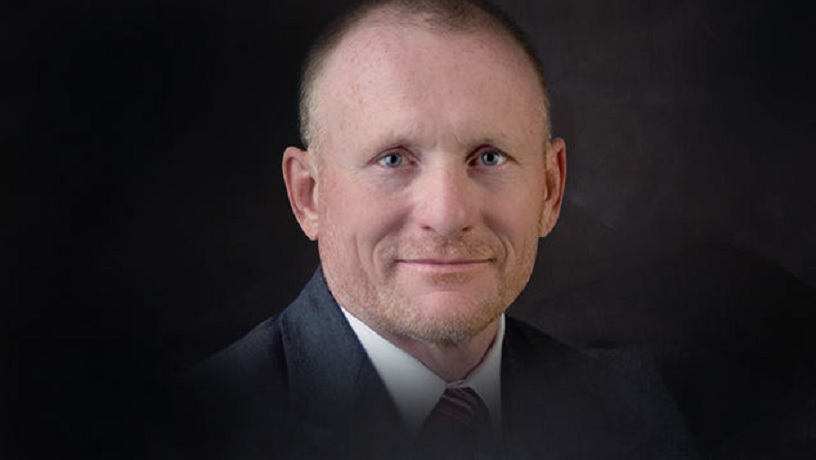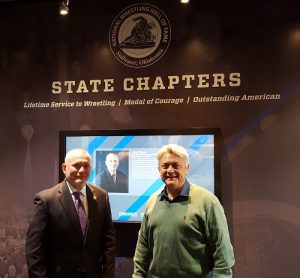
Five Questions With Board Member Jay Keel
Jay Keel of Ada, Oklahoma, began serving as a member of the Board of Governors of the National Wrestling Hall of Fame in 2012. Recognized as an Outstanding American by the Oklahoma Chapter of the National Wrestling Hall of Fame in 2009, Jay finished third in the Oklahoma state high school tournament in 1976 and wrestled at the Haskell Indian Nations College in Lawrence, Kansas, before a knee injury ended his career.  He then attended East Central University in Ada, Oklahoma, and received his bachelor’s degree in speech communication Jay became an ordained and licensed minister after college, serving as a youth pastor for more than 10 years and working 16 years to establish a Youth and Family Services team in the Chickasaw Nation. He currently serves as the Secretary of Family Services for the Chickasaw Nation, overseeing programs and opportunities that support strong and healthy Chickasaw families.
He then attended East Central University in Ada, Oklahoma, and received his bachelor’s degree in speech communication Jay became an ordained and licensed minister after college, serving as a youth pastor for more than 10 years and working 16 years to establish a Youth and Family Services team in the Chickasaw Nation. He currently serves as the Secretary of Family Services for the Chickasaw Nation, overseeing programs and opportunities that support strong and healthy Chickasaw families.
Why is it important to be involved with the National Wrestling Hall of Fame?
The National Wrestling Hall of Fame is the primary gatekeeper of everything that wrestling means to young people and to communities. It’s the best way to keep the sport alive.
What is your role with the Chickasaw Nation?
I am Secretary of Family Services, which provides human services and mental health services. We are one of the larger tribes in the country and under our sovereign nation we have a constitutional government that is much like the United States government. We have nearly 70,000 citizens of the Chickasaw Nation. Our traditional boundaries are 13 counties in south central Oklahoma, but our citizens live all the way from San Diego to Maine and into a few other countries. Most of our citizens, however, are in Oklahoma.
How do we get more Native Americans involved with the sport of wrestling?
I think we get them involved through wrestling camps. I’m not saying wrestling camps are the end-all, but camps are a great way to introduce the sport and help a native kid who may have felt isolated or left out of the larger society. Wrestling is more accessible and more inclusive than any sport that I’m aware of. The local programs and local camps are a good way to generate interest in wrestling.
How did you overcome the knee injury you suffered in college?
I’m not sure if I have. It was just through typical rehab. I injured my knee in wrestling practice and had some ligament damage.
How important is wrestling to your daily life?
Wrestling is immensely important. When I was in high school, I was out of control and wrestling helped to keep me focused and really was the only thing that got me through high school. Wrestling helps you to understand that you get back up when you get knocked down. It gives you fortitude and determination that you draw upon every day. It also helps you appreciate community and team. I draw strength from wrestling daily. The ability to overcome in difficult situations and to lead others can be attributed in part to my years as a wrestler.
 He then attended East Central University in Ada, Oklahoma, and received his bachelor’s degree in speech communication Jay became an ordained and licensed minister after college, serving as a youth pastor for more than 10 years and working 16 years to establish a Youth and Family Services team in the Chickasaw Nation. He currently serves as the Secretary of Family Services for the Chickasaw Nation, overseeing programs and opportunities that support strong and healthy Chickasaw families.
He then attended East Central University in Ada, Oklahoma, and received his bachelor’s degree in speech communication Jay became an ordained and licensed minister after college, serving as a youth pastor for more than 10 years and working 16 years to establish a Youth and Family Services team in the Chickasaw Nation. He currently serves as the Secretary of Family Services for the Chickasaw Nation, overseeing programs and opportunities that support strong and healthy Chickasaw families.Why is it important to be involved with the National Wrestling Hall of Fame?
The National Wrestling Hall of Fame is the primary gatekeeper of everything that wrestling means to young people and to communities. It’s the best way to keep the sport alive.
What is your role with the Chickasaw Nation?
I am Secretary of Family Services, which provides human services and mental health services. We are one of the larger tribes in the country and under our sovereign nation we have a constitutional government that is much like the United States government. We have nearly 70,000 citizens of the Chickasaw Nation. Our traditional boundaries are 13 counties in south central Oklahoma, but our citizens live all the way from San Diego to Maine and into a few other countries. Most of our citizens, however, are in Oklahoma.
How do we get more Native Americans involved with the sport of wrestling?
I think we get them involved through wrestling camps. I’m not saying wrestling camps are the end-all, but camps are a great way to introduce the sport and help a native kid who may have felt isolated or left out of the larger society. Wrestling is more accessible and more inclusive than any sport that I’m aware of. The local programs and local camps are a good way to generate interest in wrestling.
How did you overcome the knee injury you suffered in college?
I’m not sure if I have. It was just through typical rehab. I injured my knee in wrestling practice and had some ligament damage.
How important is wrestling to your daily life?
Wrestling is immensely important. When I was in high school, I was out of control and wrestling helped to keep me focused and really was the only thing that got me through high school. Wrestling helps you to understand that you get back up when you get knocked down. It gives you fortitude and determination that you draw upon every day. It also helps you appreciate community and team. I draw strength from wrestling daily. The ability to overcome in difficult situations and to lead others can be attributed in part to my years as a wrestler.